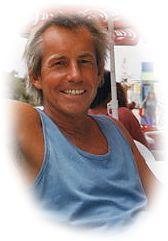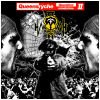Interview with GRAHAM HURLEY

Graham Hurley is the author of the highly readable DI Jo Faraday novels set in and around Portsmouth in the UK. They pull no punches and deal with many current and topical issues. I would personally recommend reading 'Cut To Black' and his new novel, 'Blood And Honey' (published in January 2006) as good starting points.
More at -
www.grahamhurley.co.uk
www.orionbooks.co.uk
What am I currently up to?
The summer is a fallow period for yours truly. We live by the sea. We swim a great deal. Sail. Windsurf. Idle around. And in between ladling on the Factor 15, I get to think about the next book (number seven in the Joe Faraday series). The working title is One Under. I have the opening scene already written, a shape for the narrative, and a broad fix on where this next fictional rocket may land. The detailed research is done but before I get down to the hard graft we're taking off in the camper to France. To my astonishment, the books are doing really well there. The French seem to have a taste for inner-city anarchy, and the efforts of guys like Faraday to try and light a candle or two in the gathering darkness. In fact they appear to have taken Joe to their collective hearts. Grace a Dieu.
You new book, 'Blood & Honey' has the Bosnian conflict and its aftermath many years later as its main backdrop. How did you resercah this and do you use your books to get personal mesages across to readers and.or highlight issues important to yourself?
You're absolutely right about the Bosnian conflict and it's aftermath with respect to Blood and Honey. It's an important narrative engine for the book, drives key parts of the plot, and kept my own pot nicely bubbling on the stove while I was writing. A while back, in another career, I made a number of TV documentaries exploring the ever-lengthening shadows cast by long-ago conflicts, and conversations with veterans from the Second World War, from various campaigns in the Fifties and Sixtties, and - more recently - from the Falklands War, taught me a great deal. Living in Portsmouth - a city literally built on blood and treasure - gave me more food for fictional thought, and a lot of this stuff has seeped into my fiction. Both in terms of stand-alone thrillers, and now the Faraday series. Smuggling personal messsages into fiction is an extremely dodgy business. The last thing a reader wants is 400 pages of homily. At the same time, though, writing of this length is bound to absorb - seamlessly, I hope - some sense of where the writer stands. So, yes, I plead guilty - consciously or otherwise - in dreaming up situations that put my characters to particular kinds of tests. And the way they do (or don't) perform, often has a direct bearing on issues - and personal qualities - which matter to me. Think fortitude. And a sense of wry amusement.
How do you view the current crime writing scene? Is there a move towards much more graphic, dark crime writing like Ian Rankin, Mark Billingham and yourself?
Wisely or otherwise, I don't actually read much crime fiction. Getting into this genre was Orion's idea, not mine, and at first the challenge felt incredibly daunting. At that point, I wondered whether a couple of months reading other people's work might help but in the end I spent the time getting alongside working detectives. This wasn't easy but in the end I cracked it big time, and along with that kind of immersion came the (I guess inevitable) decision to make the books as authentic as possible. This gives you a problem of two, not least because the bulk of crime fighting (like war) is repetitive and deeply boring. But I sense that a determination to try and conjure on-the-page drama from the minor key - instead of an annual parade of serial killers - has paid off. The books have a growing and incredibly loyal readership, and a condition of their enthusiasm appears to be the grittiness, the realism, that underpins both character and plot. Of course I've picked up other books in the field from time to time. I think Dan Fesperman is brilliant - especially his first novel Lie in the Dark - and I admire David Peace for what he's doing with the genre. I also love the work of Alan Furst. But in other cases I sometimes wonder exactly how much time authors have spent at the coal face. All fiction is an act of trespass. So it pays to find out about the lie of the land.
Did you ever envisage the success you have had so far? What have been the highlight(s) so far?
Success is a strange term. Everything in life is relative and in my business I suspect you're never really satisfied with your sales figures or the putative size of the readership. The fact that I seem to have made a niche within a niche - see above - makes me very happy, but the actual business of conceiving and writing the books makes me happier still. To steal a phrase from my good friend Campbell Armstrong, every new start is a journey into the unexpected. And not too many jobs offer you that.
Like many characters in crime novels Jo Faraday enjoys music. Do you add your own musical tastes and albums you enjoy into your books? What music could be found on your MP3/CD player now?
Music is important to Joe Faraday, and important to me. Most contemporary stuff leaves me cold. My vinyl collection is full of Dylan, Dory Previn, Nina Simone, John Martin, Van Morrison, but the music that really matters comes from the classical end of the spectrum. I love - not necessarily in this order - Haydn, Mozart, Brahms, Mahler, Berlioz, Stravinsky. My favourite movement in most symphonies would be the adagio, and I think certain passages of Thaikovsky and Prokoviev are sublime. So there's a clue (or two).
What do you enjoy doing in your spare time?
We travel as much as possible, as often as possible. Writing occupies maybe four months a year, and the rest of the time - when we're not away - I do oodles of reading, mainly biography and history. Summer, as I said at the start, gives me the chance to get out on the water. I also adore cooking, and we spend a great deal of time hunting down quality stuff for the pot. Nothing beats a hefty six'o'clock gin with the sun in the west and a Thai green curry bubbling on the stove. Even the cat gets excited.
If (and hopefully when!) any of your novels are televised/made into a film who ideally would you like cast as the main characters and why?
I've come close on a couple of occasions to a TV adaptation of the Faraday series. I've done screenplays on previous books, and watched actors tussle with lives I've put on the page. Both experiences, oddly enough, fill me with gloom - chiefly because TV is such a different, and often brutal medium - but also because the choice of actor to play the central character can go so disastrously wrong. I have a very clear idea of who Joe Faraday is. And so far, maybe because we watch so little TV, I can't think of an actor who would fit.
Do you enjoy the specialist crime conventions/events and which ones do you most look forward to and why?
Sorry to disappoint again but I go to very few crime conventions. While it's interesting to compare notes I get the sense - certainly in my own case - that writing is necessarily a solitary business, and it helps to wall off that bit of your life. On the other hand, I get a lot of invitations to talk to reader groups, library gatherings, and some of the bigger writing conferences and I enjoy those a great deal. Favourite? The Southern Writer's Conference at Winchester. Barbara Large, who conceived and grew it, is a star.
Do you plan to stick with Faraday as a charcter in your future books for now or are you tempted to write a novel away from Faraday and the Portsmouth area? For someone going to visist Portsmouth what areas would you recommend as a 'must see'?
Interesting question. At the current sales level, according to my publisher, he's certainly worth another three books. The longer I live with these characters - not just Joe - the more I understand them. And the more I understand them, the more committed the writing becomes. Just now, I'd find it hard to live without the beckoning finger of the next book, so I have every interest in Joe's survival. Any writer's dream is a bigger and bigger readership, and I obviously hope that happens, but in my guts I think the books have something important to say about the way we live, and for that reason alone I'm happy to stick fictionally to Portsmouth. It's an extraordinary city for the working novelist. Would it offer other fictional opportunities? Undoubtedly.
Message to my readers...
God bless you.
Yours.....
......Graham Hurley.




0 Comments:
Post a Comment
<< Home